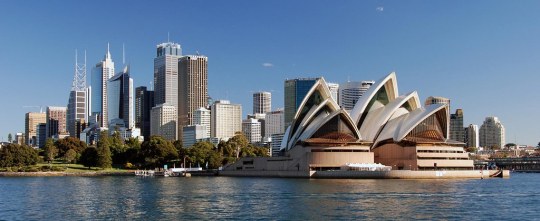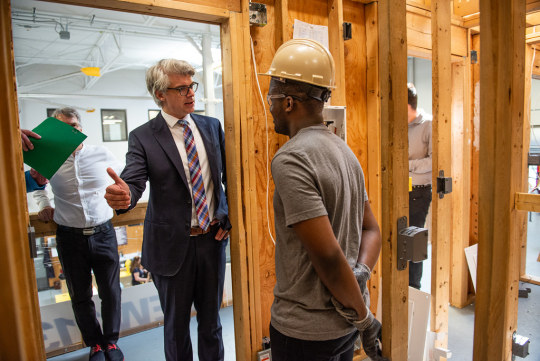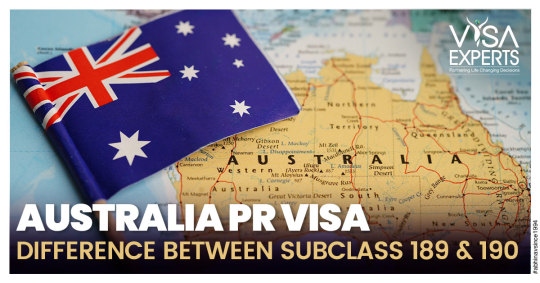#Australia subclass 189 visa
Explore tagged Tumblr posts
Text
Australia Skilled Migration Visa: Navigate Career Opportunities in Australia
The Australia Skilled Migration Visa is a point tested visa that allows a skilled migrant to live and work in Australia indefinitely. It is issued to individuals who have a specific skill set that fits the demand of the Australian market, making a significant contribution to the country's economy.

#Australia Skilled Migration Visa#Australia Skilled Migration Program#Skilled Independent Visa#Australia Subclass 189 Visa#Skilled Migration Visa#Skilled Migration Program#Skilled Migrant Visa#Skilled Visa#Subclass 189 Visa#Australia Visa#Immigrate to Australia#Migrate to Australia#Move to Australia#Settle in Australia
0 notes
Text
Want to settle down in Australia for good? Learn how the Skilled Independent Visa (subclass 189) can get you there. Follow this comprehensive guide and work with Australian visa consultants to increase approval chances.
#Skilled Independent Visa#Subclass 189 Visa#Australia Subclass 189 Visa#Australia Visa Consultants#Australia Immigration Consultants
0 notes
Text

To know about Australia PR visa processing time, you first need to understand the types of visa categories Australia offers to PR visa aspirants.
0 notes
Text
APPLY FOR SKILLED INDEPENDENT VISA 189: HONG KONG STREAM
APPLY FOR THE 189 SKILLED INDEPENDENT VISA - HONG KONG STREAM FOR AUSTRALIAN PERMANENT RESIDENCE!
Skilled Independent, Subclass 189 Visa, the Hong Kong stream – Yimin – 澳大利亚移民 Skilled Independent, Subclass 189 Visa, the Hong Kong stream – The 189 Visa – Hong Kong stream, allows an application for permanent residence if the Applicant has lived, worked and studied in Australia, on an eligible visa, for 4 years continuously, or more, such as the 457, 482 or 485 visas. Note that the Applicant…
#189 visa australia#189 visa for hong kong citizens#australian immigration lawyer#australian immigration lawyer in hong kong#australian immigration lawyers#australian migration agent in melbourne#australian migration agents#australian migration agents advice#australian migration agents in hong kong#australian permanent residence#australian visa advice#skilled 189 visa australia#skilled 190 visa australia#skilled independent 189 visa#skilled independent visa australia#skilled migration australia#skilled nominated 190 visa#subclass 189 visa australia
0 notes
Text
Australia’s immigration system is based on a points test, where applicants accumulate points based on various factors, such as age, English proficiency, work experience, education, and other qualifications. Achieving a high score on this points test is crucial for receiving an invitation to apply for an Australian Permanent Residency (PR) visa, such as the Skilled Independent visa (subclass 189), Skilled Nominated visa (subclass 190), or Skilled Work Regional (Provisional) visa (subclass 491). In this guide, we’ll break down each factor in the points test to help you understand how to maximize your score and increase your chances of securing PR.
One of the most significant contributors to your overall points score is your age. The Australian immigration system is designed to favor younger applicants, as they are likely to contribute to the workforce for a more extended period.
Proficiency in English is another crucial factor in the points test. The higher your level of English, the more points you can earn.
Your work experience, especially if it’s related to an occupation on Australia’s Skilled Occupation List (SOL), can substantially boost your points score.
Work experience within Australia is highly valued, reflecting your ability to adapt and thrive in the Australian workforce.
Experience Duration: If you’ve worked in Australia for 8–10 years in a skilled occupation, you can earn 20 points.
Why It’s Important: Australian work experience demonstrates your familiarity with the local work culture and systems, making you a more attractive candidate.
Strategies: If you’re already in Australia on a temporary visa, consider gaining as much local work experience as possible before applying for PR.
Your educational qualifications are another significant component of the points test, particularly if you hold a Doctorate degree.
If you’ve completed advanced studies in Australia, particularly in niche areas, you can earn additional points.
Australia is actively encouraging skilled migrants to live and work in regional areas, offering additional points for those who study in these locations.
Proficiency in certain community languages can earn you extra points, reflecting Australia’s multicultural society.
Completing a Professional Year program in Australia can be a valuable way to gain additional points and improve your job prospects.
State or territory governments in Australia can nominate applicants for the Skilled Nominated visa (subclass 190), which provides an additional 5 points.
If your spouse or de facto partner meets specific criteria, you can gain an additional 10 points towards your application.
If your spouse or de facto partner has competent English but does not meet the other criteria for skilled points, you can still earn an additional 5 points.
If you’re applying as a single applicant or your spouse is an Australian citizen or PR holder, you’re eligible for an additional 10 points.
Why It Matters: This category recognizes the lower potential for dependents to be a burden on the system, thereby rewarding single applicants or those with an Australian spouse.
Strategic Advantage: If your partner doesn’t meet the criteria for additional points, you might consider applying as a single applicant to gain these 10 points.
The Skilled Work Regional (Provisional) visa (subclass 491) allows applicants to live and work in regional Australia and offers a substantial 15 points for regional or family sponsorship.
Summery
Maximizing your points for Australian Permanent Residency requires careful planning and a deep understanding of the points test. By focusing on areas where you can improve, such as English proficiency, work experience, or education, you can significantly enhance your chances of receiving an invitation to apply for PR. Whether you’re applying independently, with a partner.
Originally published at https://www.visa4you.co.in on October 24, 2024.
#visa services#visa consultants#immigration consultant#permanent residency visa#Australian PR Points#maximize PR points#Australia PR eligibility#skilled independent visa#subclass 189#Australian immigration#Temporary visa
1 note
·
View note
Text

Secure Permanent Residency with the Skilled Independent Visa Subclass 189
Are you a skilled professional looking to live and work in Australia without the need for sponsorship? The Skilled Independent Visa 189 might be your best option! This permanent visa allows you to settle in Australia, offering the freedom to work in any state or territory. It’s perfect for individuals who meet specific skills criteria and pass the points test. With this visa, you can enjoy benefits like access to Medicare, the ability to sponsor relatives, and the option to apply for Australian citizenship. Our Immigration Agent in Perth can guide you through the process and help secure your future in Australia!
#Skilled Independent Visa Subclass 189#skilled independent visa 189#skilled independent subclass 189#visa subclass 189#189 Visa Australia
0 notes
Text

Move to Australia with IRA Immigration! Achieve your PR dream with expert assistance. Eligible if under 45, a graduate, and 3+ years of experience. Contact us now!
#immigration#consultant#immigration services#consultant service#visa consultancy services#visa#australia pr visa#australia pr visa consultant#pr visa#subclass 189#australia permanent resident visa#subclass 190#migrate to australia#immigrate to australia#australia visa
0 notes
Text

Unlocking Permanent Residency in Australia with Skilled Independent Visa 189
Curious about how to secure permanent residency in Australia on your own terms? The Skilled Independent Visa Subclass 189 could be your answer. This visa is designed for skilled workers who are not sponsored by an employer, state, or family member, allowing you to live and work anywhere in Australia permanently. With no regional restrictions, the Subclass 189 visa offers independence and flexibility to pursue your career goals and settle in Australia. To navigate the application process effectively, our Migration Agent Perth can guide you through eligibility requirements, including having an occupation on the relevant skilled occupation list and meeting points test requirements.
#Skilled Independent Visa Subclass 189#skilled independent visa 189#skilled independent subclass 189#visa subclass 189#189 Visa Australia#visa 189#Skilled Visa Perth
0 notes
Text
Australia Visa Subclass 189: Your Pathway to Permanent Residency
Are you a skilled professional considering a move to Australia? The Subclass 189 Skilled Independent Visa might be the perfect solution for you. This visa offers an opportunity for individuals to gain permanent residency in Australia, enabling them to live and work in one of the world’s most vibrant economies.

Here’s an overview of what you need to know:
What is the Subclass 189 Visa? The Subclass 189 visa is designed for skilled workers who wish to migrate to Australia independently, without the need for employer sponsorship. It allows successful applicants to live and work in Australia permanently, contributing to the nation’s dynamic labor market.
Key Benefits of the Subclass 189 Visa Permanent Residency:
This visa grants the right to reside in Australia indefinitely.
Unrestricted Work Rights: Visa holders can work in any occupation, offering maximum flexibility. Family Inclusion: Applicants can include immediate family members, ensuring a smooth transition for loved ones.
Access to Education: Children can enroll in public schools, and visa holders can pursue higher education at domestic tuition rates.
Healthcare Access: Permanent residents benefit from Australia’s Medicare system, ensuring access to essential healthcare services.
Pathway to Citizenship: After fulfilling residency requirements, visa holders can apply for Australian citizenship, opening the door to further benefits.
Eligibility Criteria To qualify for the Subclass 189 visa, applicants must meet the following requirements:
Age: Must be under 45 years old at the time of receiving an invitation to apply. Skilled Occupation: Must nominate an occupation listed on the Skilled Occupation List (SOL).
Skills Assessment: A positive skills assessment from a designated authority is required.
Points-Based System: Applicants must score at least 65 points based on factors such as age, English language proficiency, education, and work experience.
Health and Character Requirements: Applicants must pass health checks and provide police clearance certificates.
Application Process Skills Assessment: Begin by obtaining a positive skills assessment for your nominated occupation.
Expression of Interest (EOI): Submit an EOI through the SkillSelect platform, detailing your qualifications and points score.
Invitation to Apply (ITA): High-scoring candidates will receive an ITA for the visa.
Visa Application Submission: After receiving the ITA, submit a comprehensive visa application, including all necessary documentation and fees.
Health and Character Checks: Undergo medical examinations and provide police clearance certificates.
Await Outcome: The Department of Home Affairs will assess your application and communicate the outcome.
Conclusion The Subclass 189 Skilled Independent Visa is a valuable opportunity for skilled professionals looking to secure a prosperous future in Australia. With its numerous benefits and straightforward application process, it paves the way for a rewarding life in a country known for its high quality of life and diverse culture. If you're ready to take the next step toward your Australian dream, conduct thorough research, and consider consulting with immigration professionals to navigate the complexities of the application process. Embark on your journey today! For more information, visit www.abroadpathway.com.
#Australia Visa Subclass 189#Skilled Independent Visa#Permanent residency#Skilled Occupation List (SOL)#Employment autonomy#Healthcare access#Medicare#Family reunion provisions#Pathway to citizenship#Eligibility criteria#Age requirement#Skills assessment#Points-based assessment#English language proficiency#Expression of Interest (EOI)#Invitation to Apply (ITA)#Application process#Lodging the visa application#Documentation#Health and character checks#Processing timeline#Cost of living#Employment landscape#Educational framework#Quality of life metrics#Community resources#Migration pathway#International qualifications#Visa application fees#Comprehensive research
0 notes
Text

0 notes
Text
Understanding the Skilled Independent Visa (Subclass 189): A Complete Guide with FAQs
The Skilled Independent Visa (Subclass 189) is a highly sought-after visa for individuals who wish to live and work permanently in Australia. This visa is designed for skilled workers who are not sponsored by an employer, a state or territory, or a family member. In this blog, we will delve into the details of the Subclass 189 visa, including its requirements, application process, and benefits.
Eligibility Criteria
To be eligible for the Subclass 189 visa, applicants must:
Be under 45 years of age at the time of invitation.
Have a relevant occupation on the skilled occupation list.
Score at least 65 points on the points test.
Have a positive skills assessment for their nominated occupation.
Have competent English language proficiency.
Meet health and character requirements.
Application Process
The application process for the Subclass 189 visa involves several steps:
Skill Assessment: Obtain a positive skill assessment from the relevant assessing authority for your occupation.
Submit an Expression of Interest (EOI): Use the SkillSelect online service to submit an EOI.
Invitation to Apply: If you meet the eligibility criteria and score high enough on the points test, you may receive an invitation to apply for the visa.
Visa Application: Submit a complete visa application along with the required documents within 60 days of receiving the invitation.
Health and Character Checks: Undergo health examinations and provide police certificates to meet the health and character requirements.
Visa Decision: Wait for a decision on your visa application. Processing times can vary.
Benefits of the Subclass 189 Visa
Permanent Residency: The Subclass 189 visa grants permanent residency in Australia, allowing you to live, work, and study indefinitely in the country.
Medicare Access: You will have access to Australia's public healthcare system, Medicare.
Freedom to Travel: You can travel in and out of Australia for five years from the date the visa is granted. After this period, you can apply for a Resident Return Visa to maintain your travel rights.
Citizenship Eligibility: After meeting the residency requirements, you may be eligible to apply for Australian citizenship.
Common FAQs on Skilled Independent Visa (Subclass 189)
Q1: How long does the Subclass 189 visa application process take? A1: The processing time can vary depending on the number of applications and the completeness of your application. It is advisable to check the latest processing times on the Department of Home Affairs website.
Q2: Can I include my family members in my Subclass 189 visa application? A2: Yes, you can include your spouse or de facto partner, dependent children, and other eligible family members in your application.
Q3: Is it mandatory to have a job offer to apply for the Subclass 189 visa? A3: No, a job offer is not required for the Subclass 189 visa. This visa is based on your skills and qualifications.
Q4: Can I apply for the Subclass 189 visa if my occupation is not on the skilled occupation list? A4: No, your occupation must be on the relevant skilled occupation list to be eligible for the Subclass 189 visa.
Q5: Can I switch from a temporary visa to a Subclass 189 visa while in Australia? A5: Yes, if you meet the eligibility criteria for the Subclass 189 visa, you can apply for it while holding a temporary visa in Australia.
In conclusion, the Skilled Independent Visa (Subclass 189) is an excellent opportunity for skilled workers to obtain permanent residency in Australia. By meeting the eligibility criteria and following the application process, you can embark on a new chapter in your life in Australia.
0 notes
Text
How Can I Apply for a Subclass 189 Visa Application?

The dream of immigrating to Australia and obtaining permanent residency is a goal shared by many around the world. Australia's Subclass 189 Visa is one of the pathways that can lead you to this goal. This visa is designed for skilled workers who wish to live and work in Australia indefinitely. In this comprehensive guide, we will provide you with valuable tips and insights to help you navigate the Subclass 189 Visa application process successfully.
Understanding the Subclass 189 Visa
The Subclass 189 Visa is part of the Australian immigration program aimed at attracting highly skilled workers to contribute to the country's economy and society. This visa is a pathway to obtaining permanent residency in Australia, which, in turn, can lead to Australian citizenship. Here are some key points to keep in mind:
Skilled Immigration Australia: To be eligible for a Subclass 189 Visa, you must have skills and qualifications in an occupation listed on the Australian Skilled Occupation List (SOL). Before applying, ensure that your skills match one of the listed occupations.
Permanent Residency in Australia: This visa grants you and your family members permanent residency in Australia. This means you can live and work in Australia indefinitely and access healthcare and social services like any other Australian resident.
Pathway to Australian Citizenship: After holding a Subclass 189 Visa for a specific period, you may be eligible to apply for Australian citizenship. This offers you the opportunity to become a full-fledged Australian citizen.
Tips for a Successful Subclass 189 Visa Application

Research and Select the Right Occupation: Before starting your application, thoroughly research the Australian Skilled Occupation List to determine if your occupation is in demand. Ensure that your skills match the requirements for your chosen occupation. This is a critical step as your eligibility largely depends on this.
Assess Your Skills: You must undergo a skills assessment by a relevant assessing authority for your occupation. Make sure to provide accurate and complete documentation to support your skills assessment application. Any discrepancies or incomplete information can lead to delays or visa refusal.
Gather Required Documents: Compile all necessary documents, such as academic transcripts, work experience certificates, English language proficiency test results (e.g., IELTS or PTE), and a valid passport. Keep digital and hard copies organized for easy access during the application process.
Meet the Points Requirement: The Subclass 189 Visa application is points-based. To increase your chances of success, aim to score as high as possible on the points test. Points are awarded based on factors like age, English language proficiency, work experience, and education qualifications.
Submit a Complete Expression of Interest (EOI): You must submit an EOI through the Australian government's Skill Select system. Ensure all details are accurate, especially those related to your occupation and points score. Being truthful in your EOI is crucial for the success of your application.
Waiting for Invitation: Once your EOI is submitted, you must wait for an invitation to apply for the Subclass 189 Visa. Invitations are typically issued periodically, and the process can be competitive. Maintaining a high points score and ensuring your EOI is up to date can increase your chances of being invited.
Prepare a Strong Visa Application: After receiving an invitation, submit your visa application within the specified timeframe. Pay close attention to the information provided in the invitation, as it will include important details and documents required for the application.
Health and Character Requirements: Undergo medical examinations and provide police clearance certificates for all countries where you have lived for 12 months or more in the last 10 years. Meeting these health and character requirements is essential for visa approval.
Engage an Immigration Agent: Consider hiring a registered migration agent or immigration lawyer to assist you with the application process. They can provide valuable guidance, ensure your application is error-free, and help you navigate any complexities.
Stay Updated: Keep yourself informed about any changes in immigration policies or visa processing times. Staying updated will help you adapt your strategy if needed and prevent potential delays in your application.
Be Patient: The Subclass 189 Visa application process can be lengthy. Be prepared for waiting periods, and avoid unnecessary stress by staying patient and focused on the end goal.
Conclusion
Obtaining a Subclass 189 Visa is a significant step toward achieving your dream of permanent residency in Australia and, eventually, Australian citizenship. By following these tips and guidelines, you can increase your chances of a successful application. Remember that thorough research, attention to detail, and patience are key to navigating the Australian immigration system effectively. Your journey to a new life Down Under begins with the right steps, so start planning and working toward your goal today.
0 notes
Text

Step-by-step information on Skilled Independent Visa, what is subclass 189 visa Australia and what are the benefits and requirements of Australia work visa permit.
#Skilled Independent Visa#Skilled Migrant Visa#Subclass 189 Visa Australia#Skilled Independent Work Visa#Australia Work Visa Permit#Work Visa#Work Permit#Work Permit Visa#Work in Australia#Work Opportunities
1 note
·
View note
Text
Roadmap to Australia: A Step-by-Step Guide to Securing a Skilled Independent Visa (Subclass 189)
Here are some steps that visa aspirant should follow.
Preliminary Steps:
Skill Assessment: Get your civil engineering degree and work experience assessed by Engineers Australia or another designated authority. This is a crucial step to ensure your skills are recognized. Click Here
English Language Proficiency: Take an English language proficiency test like IELTS or PTE Academic and obtain the required score.
Check Points: The Skilled Independent Visa is points-based. Make sure you meet the points requirement, which considers age, work experience, and other factors. Check Points
Application Process:
Expression of Interest (EOI): Submit an EOI via Australia's SkillSelect online service. You'll be asked various questions based on which your points will be calculated.
Invitation to Apply: If you meet the criteria and have a sufficiently high points total, you'll receive an invitation to apply for the visa.
Documentation: Gather all required documents, including your skill assessment report, English language test results, work experience letters, and other relevant documents.
Final Steps:
Visa Application: Submit your visa application online, attaching all required documentation and paying the application fee.
Health and Character Checks: Undergo medical examinations and obtain police clearances to satisfy health and character requirements.
Visa Approval: Wait for the decision. If approved, you'll be granted a visa to live, work, and study in Australia indefinitely.
Move to Australia: Once the visa is granted, make your arrangements to move. Don't forget to activate your visa by entering Australia before the specified "initial entry date."
After Arrival:
Settling In: Find a suitable place to live, open a bank account, and familiarize yourself with local laws and customs.
Employment: Job prospects in Australia is good. Start applying for jobs in your field.
Consult with visa and immigration experts like Aussizz Group for personalized advice tailored to your situation.

0 notes
Text
AUSTRALIAN VISA AND IMMIGRATION ADVICE - FAQ
Australian Visa and Immigration Advice - FAQ
FAQ – Frequently Asked Questions Who can help with my Australian visa? We have Registered Migration Agents, Immigration lawyers and an Admin Team who will be pleased to email or call you, at a suitable time. How do I contact the Australian visa office? Email our office and arrange a time for a meeting in one of our offices or by video call. How do I contact the Department of Home Affairs…
#186 visa australia#189 visa australia#australian business immigration#australian immigration advice#australian immigration lawyer#australian immigration lawyer in hong kong#australian immigration lawyers#australian investor visa#australian migration agent in melbourne#australian migration agents#australian migration agents advice#australian migration agents in hong kong#australian permanent residence#australian residency visa#australian visa advice#australian visa advice in hong kong#australian visa advice in melbourene#australian visa advice in melbourne#australian visa advice sydney#australian work visa#skilled 189 visa australia#skilled independent 189 visa#subclass 189 visa australia#tss skills shortage visa australia#tss visa australia
0 notes
Text

Australia’s General Skilled Migration (GSM) Program is the most popular and highly preferred pathway for Indians seeking to settle in Australia. Out of all, the two highly-sought-after streams are Subclass 189 and 190 visa. Both pathways are designed to attract skilled professionals with skills needed in the Australian economy.
0 notes